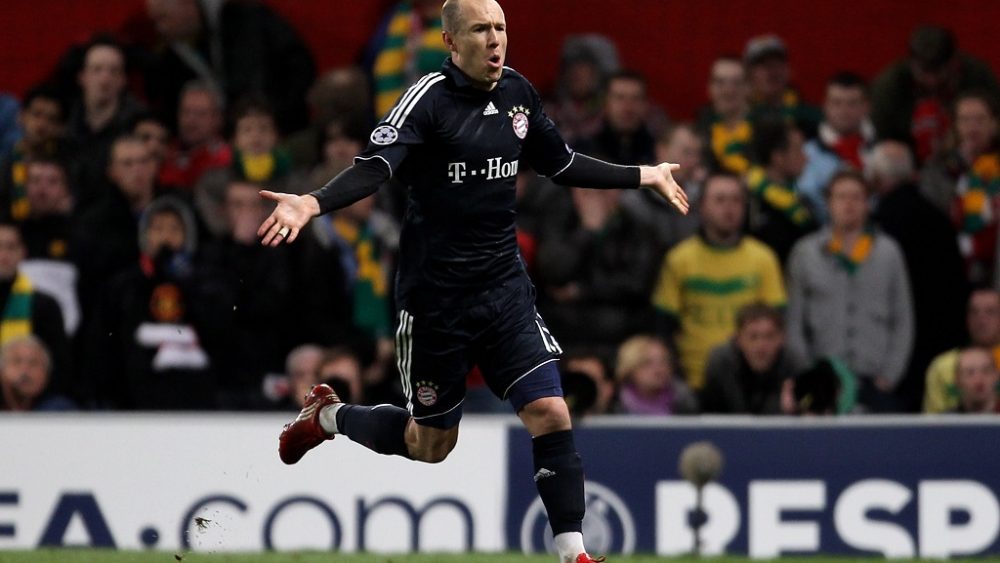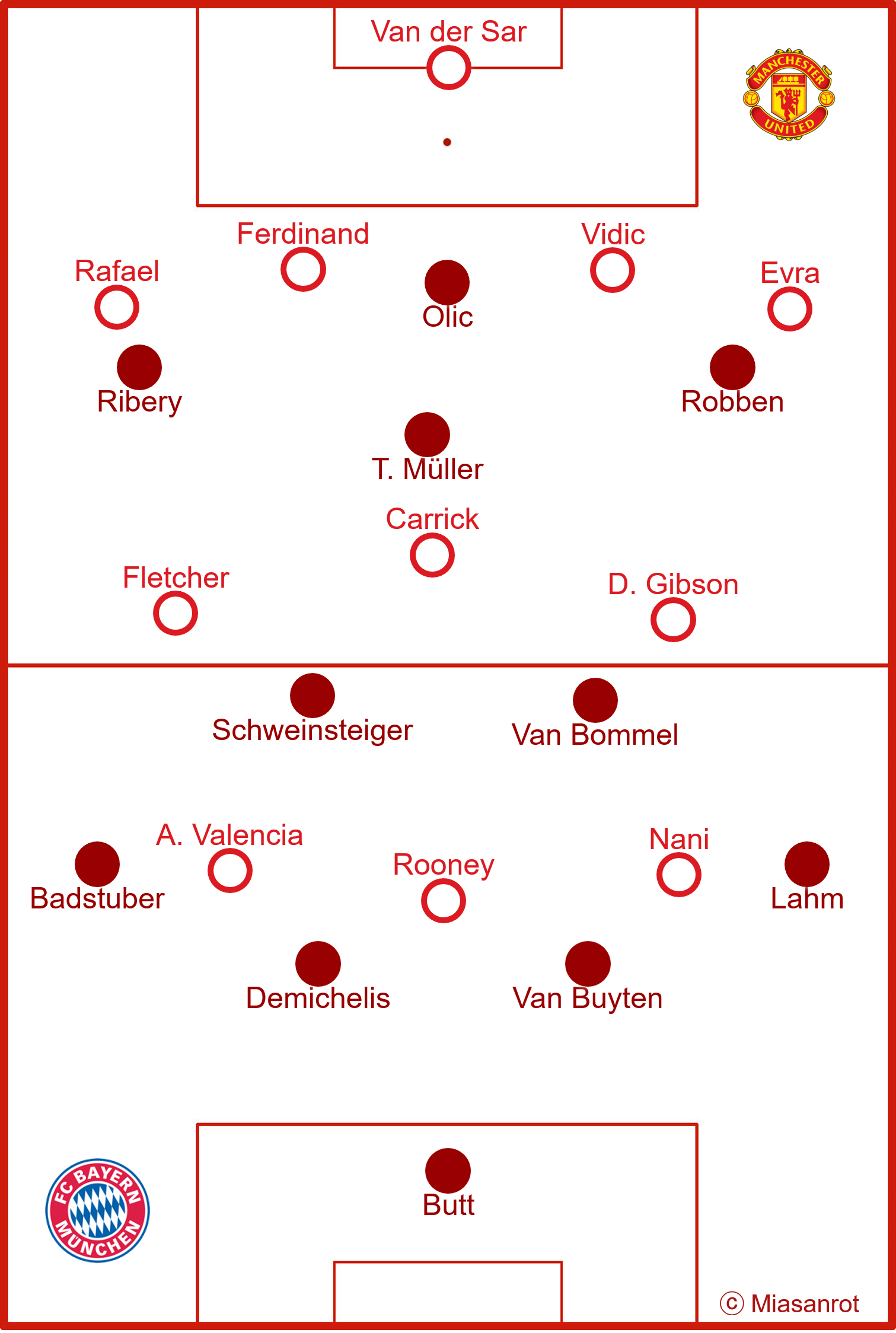Game of my life #11: Start of an era
The Situation before the game
After a very mixed first half of the season 2009/10, Bayern saw the crucial final Champions League group stage match against Juventus Turin as a turning point for the entire season. From being fourth in the table with just as many points behind the league leaders -what would have meant Europa League back then!- and the pending elimination in the Champions League, to seemingly cruising to the German Championship with a five points advantage and only missing out on a historic treble by a single loss. But it is often forgotten just how different things were looking at times during this second half of the season 2009/10.
Prior to the games against Manchester United, Bayern lost the top of the Bundesliga and also had a rocky path to the Champions League quarter-finals. Against Fiorentina a last minute victory only came with the refereeing team not seeing Miroslav Klose being yards offside when scoring the late winner in the home game. Away in Florence, Bayern was trailing twice with a two-goals deficit and only survived elimination with two long-range shots. Arjen Robben’s goal in particular can be found in every highlight video of his. The Dutchman truly became the ultimate difference maker in these weeks and even if I personally believe Robben’s absolute peak came in the calendar year 2014, the opinion of him never ever being quite as good as in these first six months of 2010 is more than understandable.
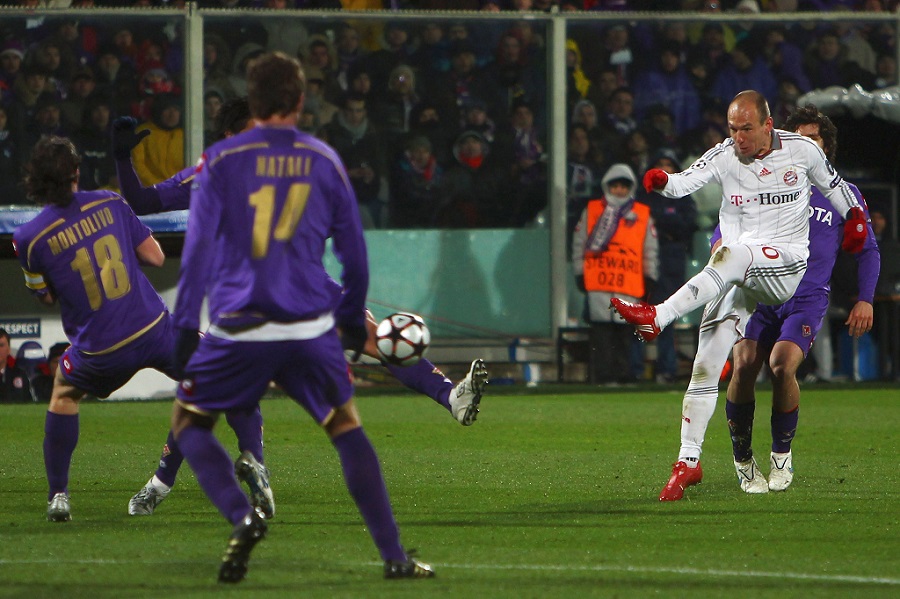
(Image: Lars Baron/Bongarts/Getty Images)
The first leg
Thus roughly a year after the era-defining loss to Barcelona, Bayern stood in the quarter-finals of the Champions League once more. The opponent had previously been Barcelona’s opponent in the finals of said previous year, Manchester United.
Without the suspended Schweinsteiger and injured Robben things began pretty dire as United scored in the opening two minutes. Nani crossed the ball from a free kick to the strangely unmarked Wayne Rooney, who did not struggle in front of goal. Bayern worked hard and gradually got better and better until completely taking over the game in the closing 15 minutes.
They drew level when Ribéry’s fairly lackluster free kick took a deflection off of Rooney’s heel yet it looked like Bayern going all out came a little too late. Suddenly in stoppage time, Mario Gómez got possibly the most absurd idea of his entire career. Facing a bunch of Champions League winners, the usually not as nimble striker decided to start dribbling from the half-way line! With huge heart, a whole lot of luck, and even a bit of skill, the resilient Gómez actually managed to beat three of his opponents – named Rooney, Scholes and Giggs, mind you! – and was only stopped by the combined efforts of Nemanja Vidić and Patrice Evra. Perhaps still befuddled by the bizarre dribbling they had just intercepted, they missed Olić sneaking up from the right-hand side, stealing the ball from Evra, only for him to beat Ferdinand, duping van der Sar with a feint shot and finish precisely where the great Dutch keeper had just been standing seconds before. Bayern had indeed beaten the great Manchester United! They passed the first act of this drama successfully, now they had to hold on to their lead a week later in the Theatre of Dreams.
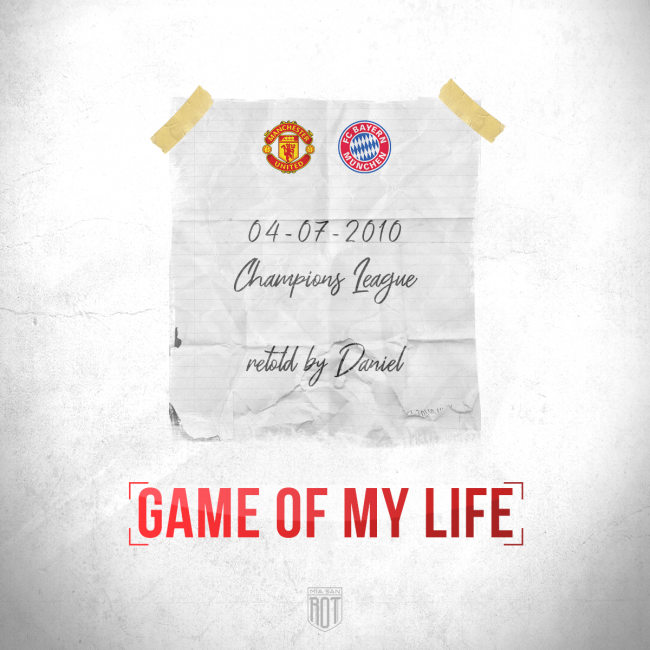
In case you forgot it
The lineups
Louis van Gaal was famous for a lot of things, varying formations were not one of them. From the moment his Bayern side had finally hit the ground in winter of 2009, they were playing in a 4-2-3-1 until his last day in Munich. Martin Demichelis and Daniel van Buyten played in central defense, Philipp Lahm as right-back. Holger Badstuber fluctuated the whole season between left center-back and left-back, against United he was playing wide. Having returned from his suspension, Bastian Schweinsteiger partnered up with Mark van Bommel in defensive midfield replacing Danijel Pranjić. Just like many times to come in the future of that decade, the attacking trident in front of them consisted of Franck Ribéry, Thomas Müller and Arjen Robben. After being originally only brought in as the fourth striker, Ivica Olić played himself into the team.
Wayne Rooney picked up an injury in the closing seconds of the first leg, thus according to Sir Alex Ferguson a day before the game, there was “no chance” of him playing. Needless to say, Rooney started the game. It was a well calculated bluff. Rafael came into the team for seasoned right-back Gary Neville, back then the da Silva twins were known to be great full-back prospects, something that never quite panned out. Patrice Evra was his pendant on the left side, while in the middle Rio Ferdinand and Nemanja Vidić were probably the world’s most physically dominant centre-halfs of the era. In United’s 4-3-3, Michael Carrick was accompanied by Fletcher and Gibson, who came into the team for Scholes. The miraculously cured Rooney was flanked by Antonio Valencia and Nani.
The first half
Olić’s last-second winner was celebrated as Bayern gave their all to travel with an advantage to Old Trafford. Yet seven minutes in and it seemed like Bayern completely through all that preparation out the window. Initially, United scored their first goal with Rafael winning his duel against Ribéry, playing it long to Rooney in the center, who then forwarded the ball with a single touch to Gibson. All of that seemed to go over way too fast for everybody at Bayern, including keeper Jörg Butt, who unceremoniously failed to cover his near post where Gibson’s shot landed. The swiftness of United’s counter-attack made for a rather typical Premier League goal of that time. Not even four minutes later Nani made it 2:0. Valencia got the ball on the right wing and was cornered by Badstuber, yet the Colombian international dribbled, stopped, feinted moving left, feinted moving right, all for Badstuber to continue standing his ground, not committing to a defensive maneuver. One can only be thankful to van Gaal for Badstuber, Müller and to a lesser degree Alaba, yet in a moment like this, it was apparent that this was still a young 21-year-old defender in his first season of professional football competing out of position away at Manchester United. Valencia held up his cross just long enough for Nani to sprint in the middle of the defenders to score a back-heel goal.
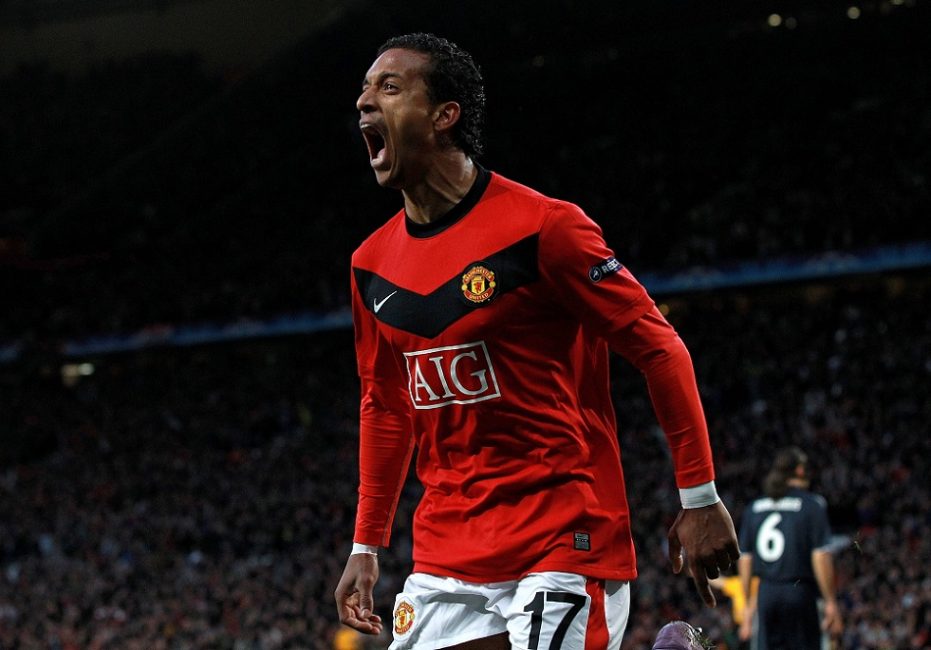
(Image: Alexander Hassenstein/Bongarts/Getty Images)
Manchester United continued to press successfully with even as technically gifted players as Franck Ribéry lost the ball in midfield. On multiple occasions, it became apparent that keeper Butt had been from the age of Oliver Kahn and not his successor Neuer, as his passes struggled finding his teammates. As the first half was progressing, the English champion continued dictating play while dialing it down a little. Bayern was not being overrun as they were in the opening seven minutes, but they still hardly ever made it past the half-way line; little was seen of van Gaal’s calm build-up play. It took them until the 26th minute for the entire team to surround United’s penalty area for the very first time. A passage of play that culminated in nothing more than a desperate long-ranged attempt of Schweinsteiger, that failed to even reach van der Sar. A good example for the danger they were facing, when did manage to reach the opponent’s half, came in the 34th minute. Ribéry lost the ball on the left wing and Bayern’s defense was ripped apart as van Buyten misjudged the ensuing wide ball. Had Rafael not lost his courage in front of goal, Bayern would have already conceded another one.
After Bayern got their first half-decent chance due to a sudden counter-attack seconds prior, the game seemed all but lost in the 41st minute. Having received the ball on the right-hand side, Valencia chipped it above the clumsily tackling Demichelis, played a precise low cross to Nani, who in turn scored with a strong shot in the left corner. Looking at Nani’s emphatic celebratory summersaults, you were inclined to believe every single Red Devil was convinced this game was done for. That might even be true for some Bayern players, but things drastically changed two minutes later. Schweinsteiger lobbed it wide to Müller, who headed the ball up front to Olić, who won the duel with Carrick, pushing him away. And even though it looked like Olić himself was pushed too far off target, to still get something out of the situation, he somehow put the ball past the baffled van der Sar into the far corner. Hope was alive before the break had even come! Suddenly Bayern took over the game and pushed forward. For the first time, Robben showed his now infamous move of cutting inside but van der Sar saved in stoppage time concluding and eventful first half 3:1.
The second half
Van Gaal switched to full-on attack-mode bringing on the unofficial matchwinner of the first leg Mario Gómez for Thomas Müller. One might have assumed the half-time break came at a bad time, considering Bayern had just pushed United back for the first time in the entire game. Yet those thoughts were uncalled for as the course of play remained virtually the same. Finally, there was well functioning build-up. Finally, Bayern ensued dominance. At last a true Louis van Gaal team was on the pitch and Rafael’s sending off in the 50th minute was only stoking this fire. Alex Ferguson would later complain the “typical Germans” had harassed Rizzoli into sending the youngster off, but if you are going to hold onto Ribéry for the better part of 10 metres, you can hardly complain when the referee shows you your second yellow card.
Down a man, Ferguson conceded ten fit players were necessary as he took off the visibly worn out Rooney. However, he did not choose to bring on another striker with Dimitar Berbatov but strengthen the midfield with John O’Shea. Nani and Valencia were believed to be enough to trouble Bayern’s defense, but the biggest casualty of United’s switch to an attacking pair was their press. Had Bayern previously struggled with United’s press as much as they would in future only struggle with Klopp’s press, Manchester was now virtually surrendering them the build-up phase. The two highest pressing players were constantly outplayed rather easily, Bayern’s dominance of the Bundesliga could now be replicated in Old Trafford. Thus Bayern’s ball possession rose significantly from mere 49% in the first half to impressive 60% after 90 minutes.
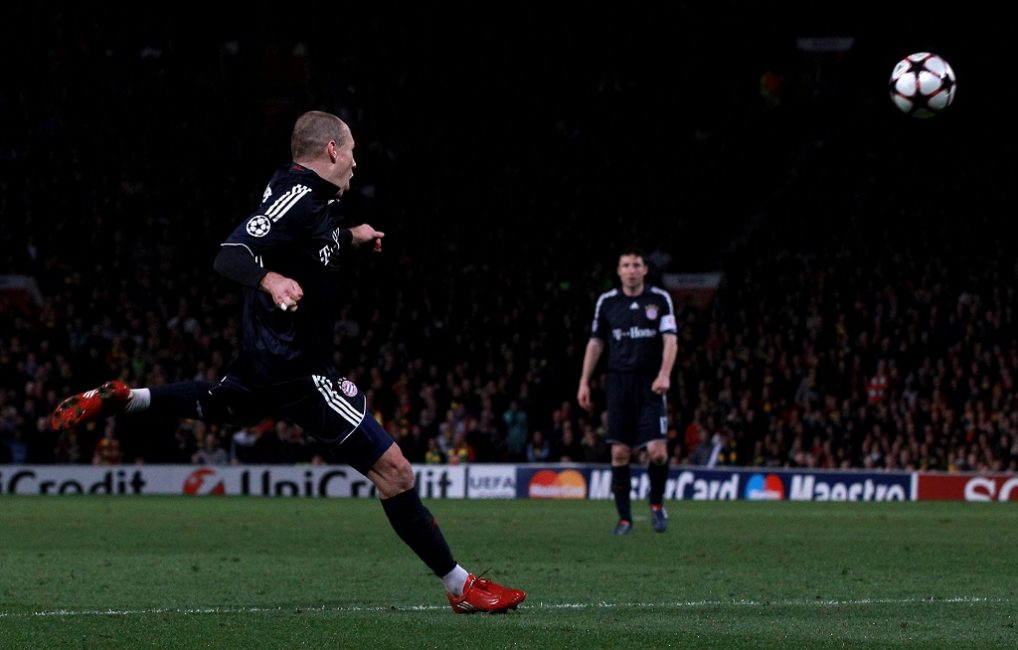
(Image: Alexander Hassenstein/Bongarts/Getty Images)
Ribéry, Gómez and Robben each had dangerous yet unsuccessful finishes until in the 74th minute Bayern was awarded with a by now legendary corner. Ribéry projected into the air how he intended to bend the ball, Robben was completely unmarked and hit a perfect volley into the far corner. Having fulfilled his duty and having missed the first leg with an injury, van Gaal took no further risks and substituted Hamit Altintop for Robben. Ferguson on the other hand realized he desperately had to strengthen his team’s attack and brought on Dimitar Berbatov and the eternal Ryan Giggs for Carrick and Gibson. This in turn prompted van Gaal to strengthen his own defence with using his last substitution to bring on defensive midfielder Danijel Pranjić for Olić and switching to a 4-3-3. Fears that now with United trailing again, the first half would return once more, were unwarranted. United desperately tried to create more opportunities, but this time Bayern was completely matching them, with good football and passion. That way United failed to get new chances, winning the game 3:2, drawing 4:4 on aggregate and Bayern progressing to the semi-finals on away goals.
Things that also caught our eye
1. Harbinger of future problems
Today, the first half against Manchester United looks a little like a peak into Bayern’s past future. Knowing now where things were heading, a few things can be seen from a different perspective. The fact that Hans Jörg Butt was not exactly a goalkeeper that wins you a Champions League was obvious. But especially the center of defence and midfield showed characteristics that Bayern willfully ignored and brushed aside in the midst of all the euphoria. Problems that would manifest with time, costing van Gaal his job and would only be solved by matters of trial and error at transfers and other things.
First of all there was a general lack of speed. To dominate games players have to position themselves high up on the pitch, but for a high line of defence you need fast defenders. Van Buyten, Demichelis, and even van Bommel simply are anything but that. They were frequently thrust into outlandish sprint duels with Valencia and Nani. Rarely had Bayern players committed as many tackles as they did against United. Among other things, that was the reason why one of the first things Jupp Heynckes did when he succeeded van Gaal, was to ask for the transfer of Jérôme Boateng.
Worse than any athletic flaws was the reaction rate. Surrounded by opponents, players just reacted to slowly. Too slow did players assess the dangers they were in, too slow did players choose the best course of action, too slow did they commit to duels. On top of that, they were passers of a different generation. Demichelis and van Buyten did not cut it with the ball at their feet, even though the latter would later go through a remarkable evolution on this front. Unsurprisingly, the future in central defence belonged to Badstuber, Boateng and Dante.
2. Mark van Bastian
To a certain extent, that was also true for captain Mark van Bommel. Although the reasons for the separation with the captain were not sporting reasons, this game might be a first signal that van Bommel could not remain Schweinsteiger’s partner on a permanent basis. He was supposed to be the “aggressive leader”, supposed to lead the team as captain and sustain Bayern’s play in a phase of weakness. Yet even van Bommel had a really tough time to keep United’s attacks in check. He lost the ball in build-up, was outplayed or was generally just positioning himself badly. At wordclass-level the 33-year-old was struggling to keep up, his range of duties were picked up by someone else: His partner Schweinsteiger.
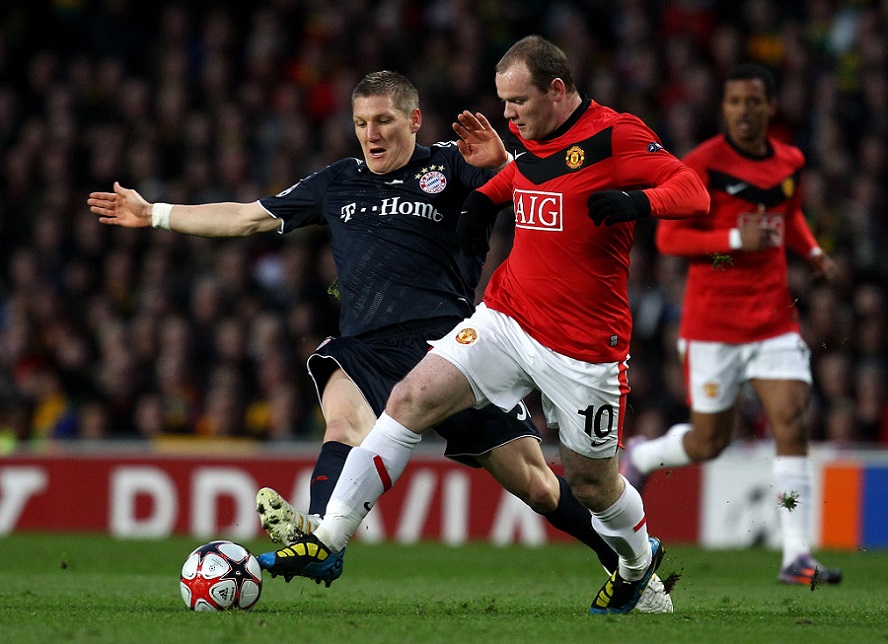
(Image: Matthew Peters/Manchester United/Getty Images)
Schweinsteiger fought and worked his heart out as if he had been tackling people his entire life. Years before the image of his face covered in blood was ingrained into everybody’s brain, he was battling United’s supremacy in the middle practically by himself. He was the only player in Bayern’s central positions who could counter United’s press and their individual superiority. The only player whose passes regularly found their recipient. It is no coincidence that it was his well-considered lob to Müller, that initiated Olić’s goal which in turn turned the entire tie. Right before the first leg, Uli Hoeneß was musing that Bastian Schweinsteiger had became a man that season. His performance in the second leg was worthy of a captain and showed just how right Hoeneß was.
3. Lahm seems wasted
In retrospect it is almost tragic knowing just how world-class a midfield player Philipp Lahm was, because along with Schweinsteiger, he was the player who struggled least with United’s attacks. The only problem: He had barely any room to show it! For the most time, United was focussing on attacking through the left-hand side. That obviously only makes sense since on that side an inexperienced center-back was playing, who no one in England could even pronounce, while already at that stage of his career Lahm had been the best full-back on the planet. Admittedly even Lahm had problems keeping up, how could he not have, when faced with his teammates’ confusing positioning and United’s players pressing like wild beasts. But on this world-class level he and Schweinsteiger were coping best, in hindsight, looking at just how simple United was breaching Bayern’s central midfield, Philipp Lahm seemed wasted as right-back.
4. Ribéry refuses defensive duties
After the lost final of the Champions League in the summer of 2012 the coaching staff showed the player clips of strikers, who were refusing any defensive duties. Cristiano Ronaldo or Zlatan Ibrahimović just standing in the centre circle watching their teammates defend. Legend tells us those clips provoked laughter. The coaching staff surrounding Jupp Heynckes wanted to gently make the point that the strikers, and Ribéry and Robben in particular, were also to defend. If they did not intend to coach Ribéry but freeze him out of the team, they could have just shown clips of the first half against United. Behind him inexperienced Holger Badstuber was targeted by almost all of United’s attacks, yet Ribéry did not move an inch. He refused to help the team, refused to get himself into the game. Without any service he was seeing little of the ball, but he just continued not participating, waiting for his teammates to win the ball at their penalty area so he could receive it at the half-way line. In reality, on the rare occasion they actually did win the ball and Ribéry did receive it, without being in the game himself, he immediately lost practically every ball.
Naturally, similar things could be said about Robben, but he had Lahm defending behind him, the opposing team was not focussing its attacks on his side and having just recovered from one of his many injuries, he even had a plausible medical excuse.
What the game meant
Almost the entire 2000s were an admission of failure on international level. With one exception they diligently qualified for the next rounds but having to compete with the first bigger name, and they were immediately out. They might manage to defeat the Arsenal of Henry and Vieira after a tough fight in 2005, but Chelsea in the next round showed them their limitations. The final result with Bayern only losing by a margin of a single goal is highly flattering here. Even the much celebrated triumph over Real Madrid in 2007 does not shine as bright if you look at the state Real was in back then. They had not yet fully recovered from their misguided Galácticos transfer policy and were knocked out year after year in the round of sixteen. The toughest pill to swallow was a year prior to this United-tie. Many might have already forgotten, but mere weeks before Jürgen Klinsmann was fired, Bayer swept over Sporting Lissabon defeating them 12:1 on aggregate in the last sixteen. But what is the point of results like these when a short time after this you are getting outclassed in the Camp Nou? With the transfers in the summer of 2007 Bayern believed those days to be over, instead they were humiliated like perhaps never before in their history.
And then a year later the games against Manchester United came to be. And sure, they had lost Carlos Tévez and especially Cristiano Ronaldo, but this was not a team in a drought. Not a club that was living off past glories. They won three consecutive league titles, a gargantuan achievement in the hard-fought Premier League. Almost every player had won the Champions League two years prior in the final against Michael Ballack’s Chelsea and a year after that, they were back in the final again. Looking back on it now, you realize even more that by no means was this a team in decline. A year after these games they would win the league once more and be back in the Champions League final. If they did not have to face quite possibly the greatest side in the history of the game with Guardiola’s Barcelona, we might now look at this Manchester United side with a whole different admiration.
And this is the side that Bayern beat. And not even in undeserving fashion. Bayern was the better side for two of the four halves of this tie and you can make the case for the first half in the first leg being more of a draw in terms of performance. When they went out without a whimper in Barcelona, the talk was that was undignified to a player like Ribéry. Arjen Robben even saw his transfer to Bayern as a step back in his career. To a certain extent, Bayern won back its status of being an international top club on that evening. It showed they were on the right path, that this team truly was becoming a side that can compete with anyone on the planet and that winning the Champions League did not have to be a utopian dream anymore.
You can only speculate what chain reaction could have been triggered if Bayern had heeded to their underdog-role and and went out against Manchester United. Would Ribéry have taken a stand on the balcony of the Munichian townhall proclaiming in broken German that he had “done 5 years more” without having seen the development of the club on the international level? Would Schweinsteiger have signed a new contract believing he could win the Champions League with his home club? Might Philipp Lahm have succumbed to the temptation of Barcelona? Might Arjen Robben have seen his opinion of Bayern affirmed, for him to leave the club after just two or three years? Had the Theatre of Dreams not make them believe, one can only speculate if this team had stayed together.

